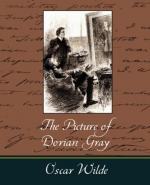“Oh, I can’t explain. When I like people immensely I never tell their names to any one. It seems like surrendering a part of them. You know how I love secrecy. It is the only thing that can make modern life wonderful or mysterious to us. The commonest thing is delightful if one only hides it. When I leave town I never tell my people where I am going. If I did, I would lose all my pleasure. It is a silly habit, I dare say, but somehow it seems to bring a great deal of romance into one’s life. I suppose you think me awfully foolish about it?”
“Not at all,” answered Lord Henry, laying his hand upon his shoulder; “not at all, my dear Basil. You seem to forget that I am married, and the one charm of marriage is that it makes a life of deception necessary for both parties. I never know where my wife is, and my wife never knows what I am doing. When we meet,—we do meet occasionally, when we dine out together, or go down to the duke’s,— we tell each other the most absurd stories with the most serious faces. My wife is very good at it,—much better, in fact, than I am. She never gets confused over her dates, and I always do. But when she does find me out, she makes no row at all. I sometimes wish she would; but she merely laughs at me.”
“I hate the way you talk about your married life, Harry,” said Basil Hallward, shaking his hand off, and strolling towards the door that led into the garden. “I believe that you are really a very good husband, but that you are thoroughly ashamed of your own virtues. You are an extraordinary fellow. You never say a moral thing, and you never do a wrong thing. Your cynicism is simply a pose.”
“Being natural is simply a pose, and the most irritating pose I know,” cried Lord Henry, laughing; and the two young men went out into the garden together, and for a time they did not speak.
After a long pause Lord Henry pulled out his watch. “I am afraid I must be going, Basil,” he murmured, “and before I go I insist on your answering a question I put to you some time ago.”
“What is that?” asked Basil Hallward, keeping his eyes fixed on the ground.
“You know quite well.”
“I do not, Harry.”
[6] “Well, I will tell you what it is.”
“Please don’t.”
“I must. I want you to explain to me why you won’t exhibit Dorian Gray’s picture. I want the real reason.”
“I told you the real reason.”
“No, you did not. You said it was because there was too much of yourself in it. Now, that is childish.”
“Harry,” said Basil Hallward, looking him straight in the face, “every portrait that is painted with feeling is a portrait of the artist, not of the sitter. The sitter is merely the accident, the occasion. It is not he who is revealed by the painter; it is rather the painter who, on the colored canvas, reveals himself. The reason I will not exhibit this picture is that I am afraid that I have shown with it the secret of my own soul.”




